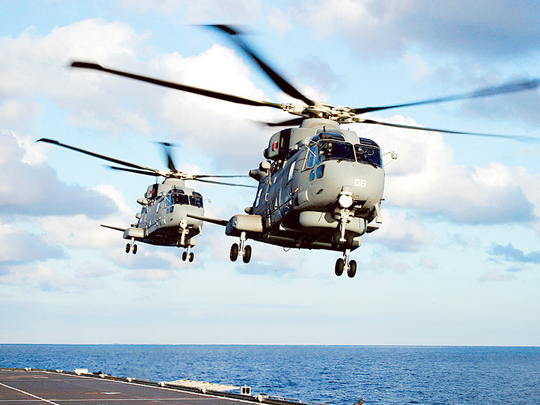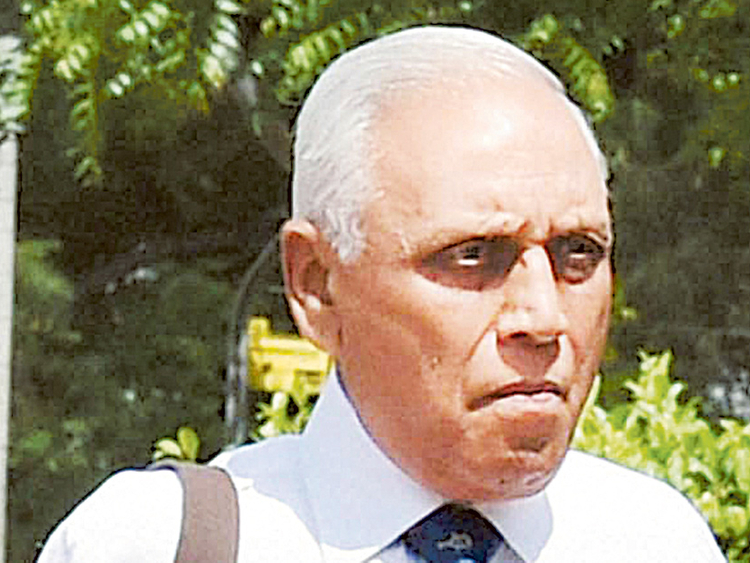
Dubai: A $734 million (Dh2.69 billion) deal gone awfully wrong.
In a nutshell, that is what India’s much-vaunted, proposed acquisition of 12 state-of-the-art VVIP helicopters has come to be. Add to that allegations of bribery to the tune of 51 million euros (Dh214.5 million), involvement of multiple middlemen with dubious credentials and a serious breach of the country’s security and services protocol.
On Monday, the Central Bureau of Investigation (CBI) questioned former IAF chief S.P. Tyagi in connection with alleged corruption in the helicopter deal.
The Milan Court of Appeals — equivalent of an Indian high court — has given details of how alleged bribes were paid by helicopter-maker Finmeccanica and AgustaWestland to Indian officials through middlemen to clinch the deal.
The order mentions the name of Tyagi at several points.
The CBI had registered a case against Tyagi along with 13 others including his cousins and European middlemen in connection with the deal.
Tyagi has denied allegations against him and has claimed that the decision to reduce the ceiling was taken by a group of senior officials.
The agency had already questioned Tyagi but the latest session is the first after the Italian court order. His cousins have also been called by the agency.
The case also makes allusions to top functionaries from the Congress, including party chief Sonia Gandhi. The Bofors scandal in the late 1980s, over kickbacks for the procurement of 155mm Howitzer guns for Indian Army from Swedish firm AB Bofors, pales in comparison to the current scandal, since the quantum of bribe paid to seal the Bofors deal was around $11 million.
The erstwhile United Progressive Alliance (UPA) government under the leadership of the then prime minister Manmohan Singh indeed owes the nation a detailed explanation as to why and how could a scam of such serious proportions occur in such a sensitive sector as defence and yet not a single arrest has been made since the issue first came to light in 2013 and a probe under the CBI was ordered. The current Bharatiya Janata Party-led dispensation at the Centre has done no better by dragging its feet on the inquiry.
Right from tweaking key parameters of the global tender, to help AgustaWestland make the cut, to allowing wheeler-dealers and middlemen an easy access to the inner precincts of the Indian Air Force’s operational aspects, there were far too many anomalies surrounding this deal and all that was happening right under the nose of the Ministry of Defence, the Prime Minister’s Office, the Air Force Headquarters and the office of the National Security Adviser. And it is indeed sad that it took an Italian court order, holding two officials responsible for the kickbacks, to make Indian authorities to sit up and take note.
It is shocking to know that AgustaWestland did not even bother to send a prototype or an actual AW-101 for trials in India and yet, those who signed on the dotted line in New Delhi were happy with whatever scratchy details they were provided with.
It has been widely reported in a section of the Indian media that, during the 10-year UPA rule, several major defence procurement programmes were put on hold indefinitely by the then defence minister A.K. Anthony for fear of allowing scamsters in. As a result, India’s operational capability, firepower and vigilance have taken a serious blow.
The scrapped AgustaWestland helicopter deal only goes to show to what extent the nation’s defence preparedness and modernisation drive were held hostage for two decades by the looming threat of middlemen and conduits in the defence sector and in the corridors of power.
AgustaWestland deal: The key players
Christian Michels: The middleman who is believed to have played a key role in the AgustaWestland helicopter deal. Michels was reportedly paid 18 million euros (Dh75.7 million) by Agusta, through his company Global Services FZE, to buy back 14 discarded Pawan Hans helicopters from Indian Air Force, as a goodwill gesture to help facilitate the larger deal for the sale of 12 HW-101 choppers to New Delhi by AgustaWestland for an estimated $734 million (Dh2.69 billion). However, according to a report in the Economic Times (ET), the Pawan Hans helicopters were never bought back and the entire kitty of 18 million euros may have been siphoned off by Michels to “grease the wheels of decision-making” and facilitate the parent deal of $610 million.
Quoting an Enforcement Directorate official in India, an Economic Times report says a company called Gufic Trading was probably floated by Michels to siphon off 18 million euros from Global Services FZE.
The Italian Court of Appeals has been scathing in its criticism of the role played by Michels and the decision by Agusta to pay him 18 million euros to buy back 14 Pawan Hans helicopters – practically junk material.
Guido Haschke, Carlo Gerosa and Gautam Khaitan
The business-partner duo of Haschke and Gerosa is believed to have been closely involved in bribing people in India to help swing the deal in favour of AgustaWestland. Haschke and Gerosa had reportedly built a complex maze of companies to help route the kickbacks to India, while Delhi-based lawyer Khaitan is believed to have played a key role in moving bribe money in India. The money trail is believed to be so complicated that it may take years for the sleuths to get to the actual recipients of bribes.
S.P. Tyagi:
Interestingly, when tenders were floated inviting bids for 12 specialised, high-security helicopters, one of the key parameters was that these helicopters should be able to fly at an altitude of 6,000 metres. AgustaWestland helicopters did not meet this crucial criteria and therefore did not make the initial short list.
This was when Air Chief Marshal S.P. Tyagi took over as the chief-of-staff in the Indian Air Force and soon, two crucial modifications were introduced in the bidding process: The operational ceiling altitude was reduced from 6,000 metres to 4,500 metres and the cabin height of the helicopters was stipulated to be at a minimum of 1.8 metres. Inclusion of the latter parameter, in particular, was the clincher as it saw AgustaWestland emerge as the sole vendor. Incorporation of these modifications were severely criticised by the Comptroller and Auditor General’s office in India, as cited in an Op-ed piece in Gulf News on August 20, 2013.
It has been alleged that Tyagi’s cousins Rajiv, Sanjeev and Sandeep were actively involved as middlemen in the entire deal and were privy to a lot of insider information that was by all means classified and sensitive data on the Indian Air Force’s exact requirements for the helicopters may have been exchanged between people with vested interests in New Delhi and those in Italy – a serious breach of India’s security and Services protocol.
AgustaWestland scandal: A timeline
- Aug. 1999 - Indian Air Force (IAF) proposes replacement of Mi-8 helicopters due to operational constraints.
- March 2002 - A global tender for bids issued.
- Jan. 2010 - The Cabinet Committee on Security clears proposal to acquire 12 helicopters for use of VVIPs after a long process that involved changes in some parameters.
- Feb. 8, 2010 - Ministry of Defence (MoD) concludes contract for supply of 12 AW-101 VVIP helicopters with AgustaWestland.
- February 2012 - Media reports of bribery in the helicopter deal appear.
- Feb. 12, 2013 - Italian Police arrests Giuseppe Orsi, CEO of Finmeccanica, parent company of AgustaWestland, as part of bribery investigations into the deal.
- Feb. 15, 2013 - MOD initiates action for cancellation of contract and puts on hold payments to company. Investigation handed over to Central Bureau of Investigation (CBI).
- Feb. 25, 2013 - CBI registers a preliminary enquiry (PE) against 11 people, including former IAF chief S.P. Tyagi, and four companies.
- March 13, 2013 - CBI registers a first information report (FIR) against Tyagi and 12 others for alleged criminal conspiracy and cheating.
- Jan. 1, 2014 - Indian government terminates the agreement on grounds of breach of the Pre-contract Integrity Pact (PCIP).
- April 2016 - Guiseppe Orsi, former Finmeccanica CEO, and Bruno Spagnolini, former head of AgustaWestland, sentenced to four-and-a-half years’ and four years’ imprisonment, respectively, by a Milan court.













